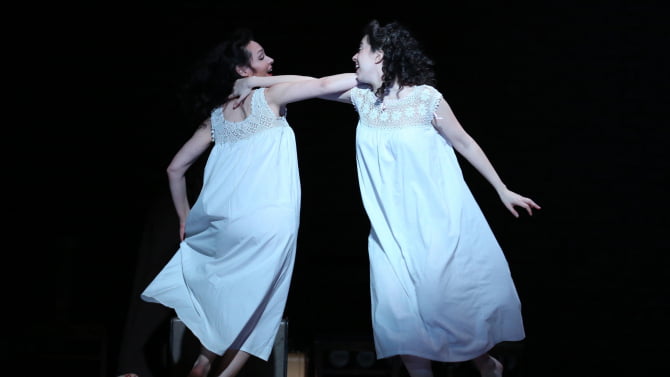Despite its sordid plot — about a respectable family that builds a flourishing business from the brothel they operate in their basement — no eyebrows were raised when “Gott fun Nekoma” was performed by the Jewish acting troupe that brought the Yiddish play to New York. But when Asch’s drama was translated into English as “The God of Vengeance” and moved uptown from the Provincetown Playhouse to Broadway in 1922, even a worldly theater critic like Heywood Broun was made to feel “a little sick.”
It wasn’t the brothel scenes that disturbed critics, shocked audiences and dragged the show’s producer and leading man into an obscenity trial. There were plenty of titillating so-called “brothel plays” in New York in those days. It was the enthusiastic (and unrepentant) lesbian romance between the daughter of the brothel owner and one of his working girls that shocked uptown audiences.
Vogel’s layered text puts that infamous 1922 production of “God of Vengeance” in the broadest possible context. So while we don’t actually see the play performed, we’re left with a vivid impression of the drama, beginning with its origins in Warsaw in 1906. We’re also made to feel the powerful impact of a critical lesbian love scene, played in the rain with singular grace by the alluring Katrina Lenk and Adina Verson. (In translation, it’s an austerely beautiful scene.)
Thanks to Taichman’s impressionistic direction and David Dorfman’s stylized choreography, a troupe of long-slumbering Yiddish actors rise from the ashes and stiffly come to life to play their parts in this drama. (Credit Christopher Akerlind for the eerie lighting design that has this phantom troupe suspended somewhere beyond time and space.)
Once animated, the company ceremonially enacts the origins of the play: its creation by neophyte playwright Sholem Asch (Max Gordon Moore), the acquisition of a troupe of professional actors (headed by the excellent Tom Nelis), and even the services of an inexperienced but eager stage manager (the outstanding Richard Topol).
But “The God of Vengeance” was not an easy sell to these seasoned Yiddish theater professionals. Asch makes a strong case for the merits of his play: “We need plays in Yiddish that are universal!” he insists. But even within the company there are arguments about fueling anti-Semitism by depicting Jews as prostitutes and pimps.
This is not a linear production, so scenes in real time bleed into times past and future, and backstage scenes echo scenes within the play. But from time to time the audience can’t help but apply its own knowledge — of the ominous threat of Hitler’s gathering power in Germany, for example — to scenes in which the company calmly discusses whether to bring their successful play to the United States.
We already know the outcome of their professional arguments. But such is the tension of the production, you want to stand up and warn this brave little troupe to catch that ship before it sails.
Broadway Review: ‘Indecent’ by Paula Vogel
Cort Theater; 1,037 seats; $127 top. Opened on Broadway April 18, 2017. Reviewed in its Off Broadway run May 12, 2016. Running time: ONE HOUR, 45 MIN.
Production
A presentation by Daryl Roth, Elizabeth I. McCann, Cody Lassen, Jerry Meyer, Jay Alix & Una Jackman, Elizabeth Armstrong, Julie Boardman, CoGro Partners, Nicole Eisenberg, Four Star Productions, GLS Productions, The John Gore Organization, Kathleen K. Johnson, Dana M. Lerner, Jenn Maley, Mano-Horn Productions, Marc Platt, Storyboard Entertainment in association with Yale Repertory Theatre, La Jolla Playhouse and Vineyard Theatre presentation of a play in one act by Paula Vogel and created by Vogel and Rebecca Taichman.
Creative
Directed by Rebecca Taichman. Choreography by David Dorfman. Sets, Riccardo Hernandez; costumes, Emily Rebholz; lighting, Christopher Akerlind; sound, Matt Hubbs; projections, Tal Yarden; composers & music directors, Lisa Gutkin & Aaron Halva; production stage manager, Terri K. Kohler.
Cast
Katrina Lenk, Mimi Lieber, Max Gordon Moore, Tom Nelis, Steven Rattazzi, Richard Topol, Adina Verson, Matt Darriau, Lisa Gutkin, Aaron Halva.
[“Source-variety”]











